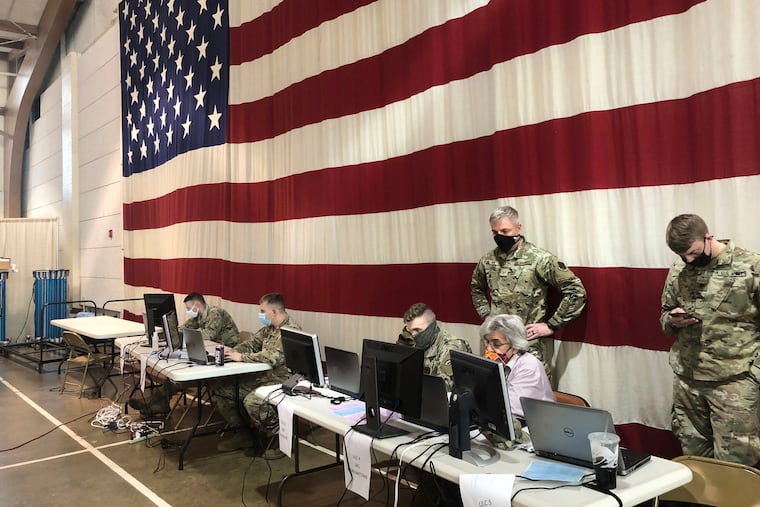Vaccine distribution is a mess. Time to call in the National Guard. | Expert Opinion
A wartime-like focus on vaccination is needed as the country struggles with less than 40% of distributed dose administered.

This week marks one year since SARS-CoV-2 was confirmed in the United States, with our direct death toll now more than 400,000 lives. Daily U.S. COVID-19 fatalities recently exceeded 4,000, and current transmission rates signal an escalating humanitarian disaster in the pandemic’s epicenter. While ongoing masking and physical distancing remain paramount to stop the spread, efficacy of more than 94% for the newly developed mRNA vaccines signals this is the best, albeit preventative, medication in the COVID-19 pandemic.
Local education and outreach will be crucial to address hesitancy, but vast variations in local scheduling and distribution recently seen across the United States demonstrate the need for centralized planning and logistics. Recognizing the bungled vaccine rollout, the Biden administration recently announced a new comprehensive plan including increases in available vaccine, FEMA support, and federal funding to reimburse states for efforts to improve logistics, including National Guard deployments.
» READ MORE: Pa. and Philly expand COVID-19 vaccine groups, but confusion remains for residents
As we continue to witness the immense suffering that results from the illness, isolation, and deaths from COVID-19 in our patients, and in our own families, there is no question: We must move faster. A wartime-like focus on vaccination is needed as the country struggles with less than 40% of distributed dose administered. Vaccine administration, not supply, is the current bottleneck, and it is time for states to call in experts in logistics and to deploy the National Guard.
Military engagement in global outbreak response is becoming more common in many countries, recognizing the potential to partner toward common goals during humanitarian emergencies. Doctors Without Borders even called for military medical teams during the 2014 escalation of the West Africa Ebola epidemic. Uniformed services engaged in the civilian space can have challenges, but we have seen great benefit in partnering.
From post-earthquake Haiti, to establishing Ebola treatment units in Liberia, and now with COVID-19 outbreak containment efforts, we have experienced how their logistics expertise, technical support, and clear command structure can buttress an outbreak or disaster response. Considering this pandemic of a century, further activating reserve teams as an immediate resource to support mass-vaccination logistics is warranted.
More contagious viral variants are expected to compound the current COVID-19 surge. Experts estimate that these variants may be dominant in the United States by March, making delays all the more deadly. Ongoing spread also allows for more viral mutations, so it is critical that we don’t give the virus more opportunity to evolve ahead of currently potent vaccines.
There are already multiple ongoing criminal investigations into vaccine fraud, theft, and destruction. In addition to overt criminal activity, an uneven rollout in the United States may leave racial and economic minority groups, those already disproportionately affected by COVID-19, at the end of the line. Only half of states have a distribution plan that explicitly mentions addressing racial inequity, and economic and age discrimination is built into many county rollout plans that rely on internet access to be notified of vaccine clinics and make appointments. A system without clearer guidance and a secure supply chain is vulnerable to both attack and inequity, further degrading the trust of the American people in this process.
In Pennsylvania, the National Guard has already assisted with numerous COVID-related logistical challenges, and one of the most valuable contributions has been its work with us supporting long-term care facilities struggling with COVID-19 outbreaks. Soldiers have served as crisis staff members providing direct care to residents in homes with significant outbreaks, in addition to providing infection-control expertise and supplies, mobilizing with single-day notice.
The teamwork among the Guard, our health system, other local hospitals, and long-term care facilities demonstrates the ability to effectively partner in overcoming challenges. Maryland’s governor recently activated National Guard Emergency Vaccination Teams to support local health departments with administering vaccines and providing logistical support, and other states are starting to follow suit for vaccination.
» READ MORE: U.S. coronavirus deaths top 400,000 in Trump’s final hours
Organizing national pharmacy-chain distribution, stadium and school parking lots, and creating pop-up sites in areas with limited access needs to happen, but these efforts involve significant initial operational support, particularly considering the vaccine’s particular cold-storage needs and then limited shelf life. Left to depleted health departments, this would take significant time and funding to ramp up. Further federal engagement and National Guard support for mass vaccination efforts will quickly save lives and help change course for this pandemic.
Dr. Efrat R. Kean and Dr. Patricia C. Henwood are emergency medicine physicians at Thomas Jefferson University Hospital in Philadelphia. Kean was a medic in Israel and now leads Jefferson Health’s COVID-19 Rapid Response Teams as part of Pennsylvania’s Regional Congregate Care Assistance Teams. Henwood works in humanitarian response and leads Jefferson Health’s COVID-19 Emergency Medicine Task Force.